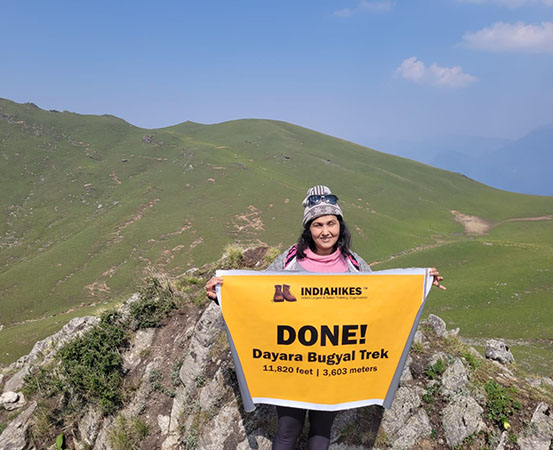Bengaluru woman Archana Hosangadi’s never-give-up spirit helped her defeat triple-negative breast cancer
Written By Ankita Dey
It was a sunny morning in June 2022 when eight cancer survivors went trekking to Dayara Bugyal in Uttarakhand, successfully scaling 11,820 feet.
Archana Hosangadi, a 51-year-old bank manager from Bengaluru, was among the group of trekkers who achieved the feat.
Archana was 48 when she was diagnosed with breast cancer.
“The trek served as a boost for my confidence. I was initially sceptical to take the plunge, as the years spent in survival mode had dampened my belief in my abilities. The feeling after achieving the feat was exhilarating and helped me regain my perspective on life,” says Archana.
The breast cancer diagnosis
Fit and active Archana was living a healthy life with her husband and her son. One day, in May 2019, she heard a story of a breast cancer survivor from her friend which made her curious and check her breast. While checking, she grew suspicious while spotting a lump in her right breast and immediately rushed to the doctor.
Dr Jayanti Thumsi, lead surgeon and breast oncologist from Apollo hospital, Bengaluru, asked her to undergo a fine needle aspiration test (FNAC), a diagnostic procedure in cancer detection.
Speaking to Happiest Health about Archana’s case, Dr Thumsi explains that there are two types of biopsies – FNAC and core biopsy.
“In the FNAC test, some cells are collected from the suspected area of the body and checked under a microscope, whereas in core biopsy, a larger tissue sample is collected for a detailed check. Core biopsy is a more effective method to detect cancer than the fine needle biopsy,” she says.
Facing the fear
In just a couple of days, her fears were confirmed. Archana received a call from her doctor who said that she was diagnosed with triple-negative breast cancer.
“I was totally shocked at that moment and never thought that this could happen to me as I always maintained a healthy lifestyle. I had no pain at all,” says Archana.
According to Dr Thumsi, triple-negative cancer is the most aggressive type of cancer. “The success rate of the treatment is high if it is diagnosed at stage one or two. However, the recurrence rate of the cancer is high.”
Triple-negative breast cancer is characterised by the absence of three receptors (estrogen, progesterone, HER2-negative) that is known to fuel the growth of the cancer tumour.
“My lump was growing fast, so my doctor suggested immediate surgery. After taking opinions from my relatives who are doctors, I realised that surgery was inevitable. Initially, I cried but then I felt that I needed to be strong. I gathered myself, determined to fight back,” recalls Archana.
Within two days of diagnosis, she prepared herself for surgery. After the surgical removal of the lump, she was put on chemotherapy by mid-June.
Life with chemotherapy
In Archana’s case, Dr Thumsi divided the chemotherapy into eight cycles to reduce the risk of side effects and used 25 sessions of radiation therapy (using high-energy X-rays to kill the cancer cells) to prevent the recurrence of cancer, as she didn’t remove her whole breast.
“The side effects of chemotherapy were unbearable,” adds Archana. While hair loss was one issue, her nails became brittle and some even started splitting from the tissue. The skin of her hands started peeling off and dizziness and weakness were her constant companions.
“I was weak and didn’t have the strength to walk. Many days I felt like giving up, but my family stood beside me like a pillar, constantly encouraging me and boosting my morale. Gradually I started thinking that I had to fight and overcome this,” says Archana.
Watch her story here:
Breast cancer prevention
Dr Thumsi says the following can reduce the risk of breast cancer:
- Having a first child before turning 30.
- Maintain a healthy weight, as obesity increases the risk of breast cancer.
- Avoid smoking and alcohol.
- Breastfeed for a minimum of one year.
- Avoid the use of oral contraceptives for long durations.
- A woman above 20 years should examine her breast at least once a month.
- Women above 40 years should go for mammography (X-ray imaging of the breast) to check the breast, as early detection increases the success of treatment.
Awareness is key
Archana finished her treatment in December 2020 and became cancer free. One day in 2022, Archana received a call from her doctor who told her about a trek she could do with other cancer survivors. Archana, an avid Himalayan trekker didn’t want anything to stop her from pursuing her passion. She joined the others on the trek – her first one in Uttarakhand.
It has been two years since Archana has been cancer free. She has now resumed work and hopes to complete at least one trek a year.“Now, I have a more positive outlook towards life as understand the value of every single moment. I want to say one thing to all women – take care of yourself. I feel that many women are ignorant about taking care of their health. I am determined to create awareness about breast cancer, especially in the rural pockets of India. Awareness and timely action can go a long way in triumphing over breast cancer,” she says.



